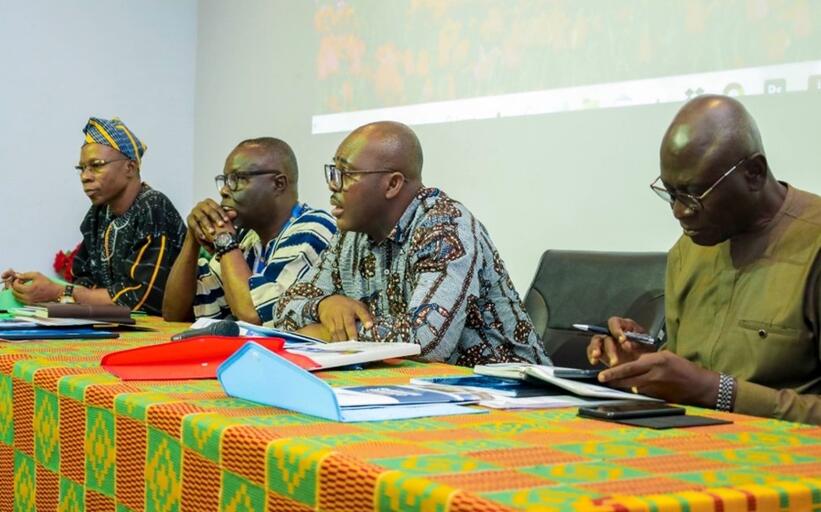
IRC and partners support CONIWAS in meeting with Parliament on the 2023 budget.
Published on: 13/03/2023
Ghana’s Coalition of NGOs in Water and Sanitation (CONIWAS) has called on the legislature to push for increased WASH budget allocation and timely disbursements to reflect government’s commitment to achieving the national and the Sustainable Development Goal (SDG) targets.
Presenting the CSO’s 2023 WASH budget analysis findings at the meeting with the parliamentary select committee on Works and Housing, which is also responsible for WASH in Accra on December 13, 2022, Basilia Nanbigne, the Executive Secretary of CONIWAS, supported by partners observed that the 2023 budget allocation to WASH under the Ministry of Sanitation and Water Resources (MSWR) is inadequate relative to Ghana’s WASH policy aspirations and the SDG commitment.
It was noted that even though the 2023 budget comes with the expectation of enhanced revenue measures and expenditure rationalisation to put a hold on spiralling inflation, manage fiscal deficit and propel economic growth in the short to medium term, the provision of social services such as WASH remains a critical poverty reduction expenditure which should be prioritised at all cost.
“The SDG six is an ambitious desire to ‘‘ensure availability and sustainable management of Water and Sanitation for All by 2030. The Government of Ghana signed onto the SDGs and is therefore expected to provide the necessary financial, human, material and technical resources as well as implement the right policies to realize this ambitious target by 2030,” the Executive Secretary stated.
The coalition bemoaned the high dependency on donor funding which stands at 94% of the total 2023 WASH budget, up from 73% in 2022. The implication is that should development partners reduce their support, the situation could be dire for the sector.
It was suggested that the Sanitation and Pollution Levy (SPL) proceeds should be directed to capital expenditure (CapEx) where the donor funding is high. Citing the slow releases, the findings indicated that only 50% of the 2022 budgetary allocation for capital expenditure (CapEx) was released to the MSWR; which was small relative to the challenges of access rate to get universal coverage by 2030, as well as the need for more funding to take care of operation and maintenance costs to boost sustainability of WASH infrastructure.
CONIWAS pointed out to the legislators that with less than 10 years to the 2030 SDG agenda, it will be difficult for the country to achieve the SDG target for WASH, if the current funding regime and disbursement of funds for implementation of the WASH programme remain same. They further demanded that:
The coalition further noted that development authorities like the Coastal Development Authority, Middle Belt Development Authority, Northern Development Authority and Zongo Development Authorities are providing some WASH infrastructure across the country, but the mechanisms for delivering the services and the role of sector institutions (MSWR, CWSA, etc.) in the coordination and ensuring sustainability of services is not clear. “We can't question how Government go about implementing its project. However, there is a risk when this type of implementation sidelines the responsible state agency like the Community Water and Sanitation Agency.”
The parliamentary select committee chair, Hon. Isaac Kwame Asiamah commended CONIWAS for the critical issues raised and invited members to comment and interact with the CONIWAS team of WASH experts.
Hon. Asiamah brought the engagement to close by assuring the CONIWAS team that the committee will take up the issues raised. He said, “We will put the issues to the Ministry of Sanitation and Water Resources and also demand clarification from the Ministry of Finance on the current arrangements used for the disbursement of the Sanitation and Pollution Levy, and the breakdown of utilisation to date.” Hon. Asiamah thanked the CONIWAS team for the diligent work done on the 2023 budget analysis, the observations and call to action.
On behalf of the CSOs, IRC Ghana Country Director, Vida Duti, thanked the honourable members of parliament for hosting the CONIWAS team and actively engaging in the discussion. She said, “CONIWAS and WASH partners will continue to engage the committee with relevant data to ensure WASH prioritisation to accelerate progress towards set national WASH and SDG targets.”
The full brief of the 2023 WASH Budget Analysis presented by CONIWAS to the parliamentary select committee on WASH is available as a download.